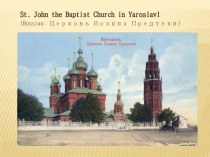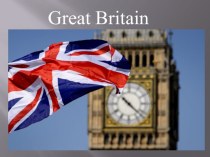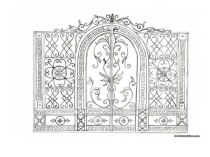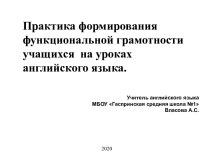- Главная
- Разное
- Бизнес и предпринимательство
- Образование
- Развлечения
- Государство
- Спорт
- Графика
- Культурология
- Еда и кулинария
- Лингвистика
- Религиоведение
- Черчение
- Физкультура
- ИЗО
- Психология
- Социология
- Английский язык
- Астрономия
- Алгебра
- Биология
- География
- Геометрия
- Детские презентации
- Информатика
- История
- Литература
- Маркетинг
- Математика
- Медицина
- Менеджмент
- Музыка
- МХК
- Немецкий язык
- ОБЖ
- Обществознание
- Окружающий мир
- Педагогика
- Русский язык
- Технология
- Физика
- Философия
- Химия
- Шаблоны, картинки для презентаций
- Экология
- Экономика
- Юриспруденция
Что такое findslide.org?
FindSlide.org - это сайт презентаций, докладов, шаблонов в формате PowerPoint.
Обратная связь
Email: Нажмите что бы посмотреть
Презентация на тему university of oxford
Содержание
- 2. The University of Oxford (commonly referred to
- 3. After disputes between students and Oxford townsfolk
- 4. Iconic university buildings include the Sheldonian Theatre
- 5. LibrariesThe University maintains the largest university library
- 6. A new book depository opened in South
- 7. MuseumsOxford maintains a number of museums
- 8. The University Museum of Natural History holds
- 9. Adjoining the Museum of Natural History is
- 10. To be a member of the university,
- 11. The colleges are:All-Souls Balliol College Brasenose Christ
- 12. The Permanent Private Halls were founded by
- 13. According to the 2012 Times Higher Education
- 14. The list of distinguished scholars at
- 15. Thank you for your attention!!!
- 16. Скачать презентацию
- 17. Похожие презентации
The University of Oxford (commonly referred to as Oxford University or simply Oxford)—located in Oxford, England, United Kingdom—is the oldest university in the English-speaking world, and the second-oldest surviving university in the world. Although its exact






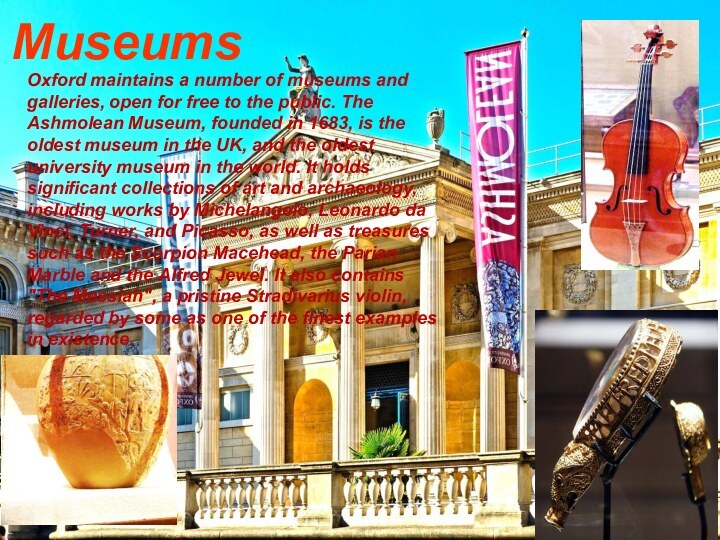
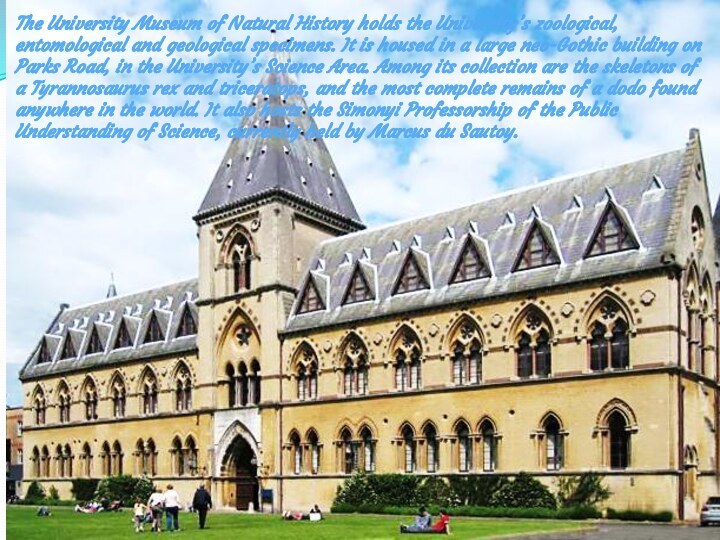

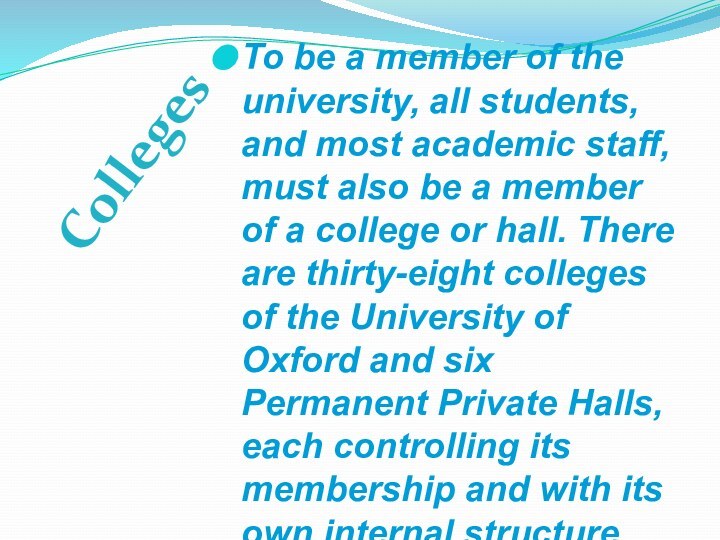





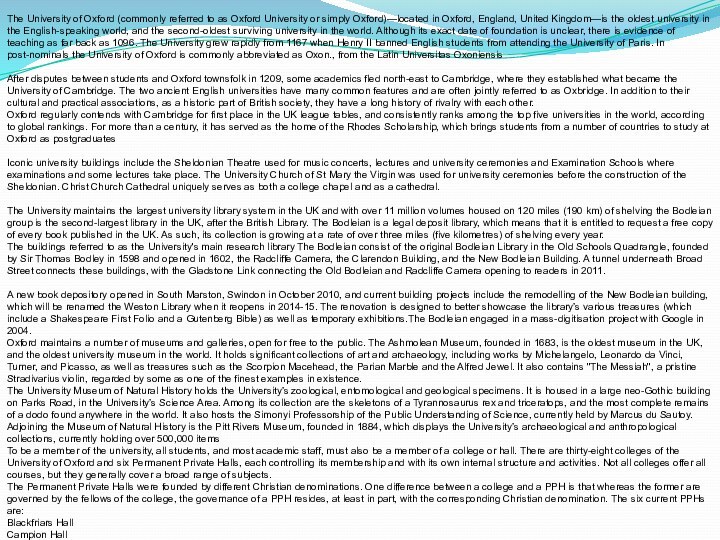
Слайд 3 After disputes between students and Oxford townsfolk in
1209, some academics fled north-east to Cambridge, where they
established what became the University of Cambridge.The two ancient English universities have many common features and are often jointly referred to as Oxbridge. In addition to their cultural and practical associations, as a historic part of British society, they have a long history of rivalry with each other.
Oxford regularly contends with Cambridge for first place in the UK league tables, and consistently ranks among the top five universities in the world, according to global rankings. For more than a century, it has served as the home of the Rhodes Scholarship, which brings students from a number of countries to study at Oxford as postgraduates
Слайд 4 Iconic university buildings include the Sheldonian Theatre used
for music concerts, lectures and university ceremonies and Examination
Schools where examinations and some lectures take place. The University Church of St Mary the Virgin was used for university ceremonies before the construction of the Sheldonian. Christ Church Cathedral uniquely serves as both a college chapel and as a cathedral.
Слайд 5
Libraries
The University maintains the largest university library system
in the UK and with over 11 million volumes
housed on 120 miles (190 km) of shelving the Bodleian group is the second-largest library in the UK, after the British Library. The Bodleian is a legal deposit library, which means that it is entitled to request a free copy of every book published in the UK. As such, its collection is growing at a rate of over three miles (five kilometres) of shelving every year.The buildings referred to as the University's main research library The Bodleian consist of the original Bodleian Library in the Old Schools Quadrangle, founded by Sir Thomas Bodley in 1598 and opened in 1602, the Radcliffe Camera, the Clarendon Building, and the New Bodleian Building. A tunnel underneath Broad Street connects these buildings, with the Gladstone Link connecting the Old Bodleian and Radcliffe Camera opening to readers in 2011.
Слайд 6 A new book depository opened in South Marston,
Swindon in October 2010, and current building projects include
the remodelling of the New Bodleian building, which will be renamed the Weston Library when it reopens in 2014-15. The renovation is designed to better showcase the library’s various treasures (which include a Shakespeare First Folio and a Gutenberg Bible) as well as temporary exhibitions.The Bodleian engaged in a mass-digitisation project with Google in 2004.
Слайд 7
Museums
Oxford maintains a number of museums and
galleries, open for free to the public. The Ashmolean
Museum, founded in 1683, is the oldest museum in the UK, and the oldest university museum in the world. It holds significant collections of art and archaeology, including works by Michelangelo, Leonardo da Vinci, Turner, and Picasso, as well as treasures such as the Scorpion Macehead, the Parian Marble and the Alfred Jewel. It also contains "The Messiah", a pristine Stradivarius violin, regarded by some as one of the finest examples in existence.Слайд 8 The University Museum of Natural History holds the
University’s zoological, entomological and geological specimens. It is housed
in a large neo-Gothic building on Parks Road, in the University’s Science Area. Among its collection are the skeletons of a Tyrannosaurus rex and triceratops, and the most complete remains of a dodo found anywhere in the world. It also hosts the Simonyi Professorship of the Public Understanding of Science, currently held by Marcus du Sautoy.Слайд 9 Adjoining the Museum of Natural History is the
Pitt Rivers Museum, founded in 1884, which displays the
University’s archaeological and anthropological collections, currently holding over 500,000 itemsСлайд 10 To be a member of the university, all
students, and most academic staff, must also be a
member of a college or hall. There are thirty-eight colleges of the University of Oxford and six Permanent Private Halls, each controlling its membership and with its own internal structure and activities. Not all colleges offer all courses, but they generally cover a broad range of subjects.Colleges
Слайд 11
The colleges are:
All-Souls
Balliol College
Brasenose
Christ Church
Corpus-Christi
Exeter
Green-Templeton
Harris-Manchester
Hertford
Jesus
Somerville
St Anne's
St Antony's
St Catherine's
St
CrossSt Edmund Hall
St Hilda's
St Hugh's
St John's
St Peter's
Trinity
University
Wadham
Wolfson
Worcester
Keble
Kellogg
Lady-Margaret-Hall
Linacre
Lincoln
Magdalen
Mansfield
Merton
New
Nuffield
Oriel
Pembroke
Queen's
Слайд 12 The Permanent Private Halls were founded by different
Christian denominations. One difference between a college and a
PPH is that whereas the former are governed by the fellows of the college, the governance of a PPH resides, at least in part, with the corresponding Christian denomination. The six current PPHs are:Blackfriars Hall
Campion Hall
Regent's Park
The PPHs and colleges join together as the Conference of Colleges, which represents the common concerns of the several colleges of the University, and to discuss policy and to deal with the central University administration. The Conference of Colleges was established as a recommendation of the Franks Commission in 1965.
St Benet's Hall
St Stephen's House
Wycliffe Hall
Слайд 13 According to the 2012 Times Higher Education World
Reputation Rankings – based on a survey of 17,554
academics over 149 countries – Oxford belongs to the elite group of six universities touted as the globally recognised 'super-brands'.Reputation
Слайд 14 The list of distinguished scholars at the
University of Oxford is long and includes many who
have made major contributions to British politics, the sciences, medicine, and literature. More than forty Nobel laureates and more than fifty world leaders have been affiliated with the University of Oxford.4 British and 8 foreign kings
47 Nobel-prize winners
25 British Prime Ministers
28 foreign presidents and prime ministers

